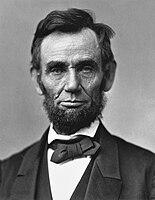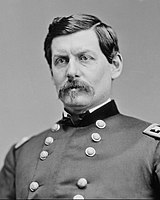
Back انتخابات الرئاسة الأمريكية 1864 Arabic ھەڵبژاردنی سەرۆکایەتیی ویلایەتە یەکگرتووەکانی ئەمریکا (١٨٦٤) CKB Præsidentvalget i USA 1864 Danish Präsidentschaftswahl in den Vereinigten Staaten 1864 German Elecciones presidenciales de Estados Unidos de 1864 Spanish Yhdysvaltain presidentinvaalit 1864 Finnish Élection présidentielle américaine de 1864 French הבחירות לנשיאות ארצות הברית 1864 HE Elezioni presidenziali negli Stati Uniti d'America del 1864 Italian 1864年アメリカ合衆国大統領選挙 Japanese
| ||||||||||||||||||||||||||||||||
234 members[a] (+17 invalidated)[b] of the Electoral College 118 electoral votes needed to win | ||||||||||||||||||||||||||||||||
|---|---|---|---|---|---|---|---|---|---|---|---|---|---|---|---|---|---|---|---|---|---|---|---|---|---|---|---|---|---|---|---|---|
| Turnout | 73.8%[3] | |||||||||||||||||||||||||||||||
| ||||||||||||||||||||||||||||||||
 Presidential election results map. Dark Red denotes states won by Lincoln/Johnson, Blue denotes those won by McClellan/Pendleton, and Maroon denotes non-voting Confederate states. The seceded states of Louisiana and Tennessee, which had recently been captured from Confederate control, held elections; however, no electoral votes were counted from either of them due to their allegiance to the Confederacy.[2] One of Nevada's three electors was snowbound and unable to cast a vote for President or Vice President.[1] Numbers indicate electoral votes cast by each state. | ||||||||||||||||||||||||||||||||
| ||||||||||||||||||||||||||||||||
Presidential elections were held in the United States on November 8, 1864, near the end of the American Civil War. Incumbent President Abraham Lincoln of the National Union Party easily defeated the Democratic nominee, former General George B. McClellan, by a wide margin of 212–21 in the electoral college, with 55% of the popular vote. For the election, the Republican Party and some Democrats created the National Union Party, especially to attract War Democrats.
Despite some intra-party opposition from Salmon Chase and the Radical Republicans, Lincoln won his party's nomination at the 1864 National Union National Convention. Rather than re-nominate Vice President Hannibal Hamlin, the convention selected Andrew Johnson of Tennessee, a War Democrat, as Lincoln's running mate. John C. Frémont, who had been the Republican nominee in 1856, started to run as the nominee of the new Radical Democracy Party, with War Democrat John Cochrane as Frémont's running mate; the new party criticized Lincoln for being too moderate on the issue of racial equality, but Frémont and Cochrane withdrew from the race in September and their new party dissolved. The Democrats were divided between the Copperheads, who favored immediate peace with the Confederacy, and War Democrats, who supported the war. The 1864 Democratic National Convention nominated McClellan, a War Democrat, but adopted a platform advocating peace with the Confederacy, which McClellan rejected, although his running mate George H. Pendleton wrote it. While the Confederacy seemed to have survival potential in summer 1864, it was visibly collapsing by election day in November.
Despite his early fears of defeat, Lincoln won strong majorities in the popular and electoral vote, partly as a result of the recent Union victory at the Battle of Atlanta.[4] As the Civil War was still raging, no electoral votes were counted from any of the eleven southern states that had joined the Confederate States of America.[2] Lincoln's re-election ensured that he would preside over the successful conclusion of the Civil War.
Lincoln's victory made him the first president to win re-election since Andrew Jackson in 1832, as well as the first Northern president to ever win re-election. Lincoln was assassinated less than two months into his second term, and he was succeeded by his vice president, Andrew Johnson, who favored quick restoration of the seceded states to the Union without protection for the former slaves. This led to conflict with the Republican-dominated Congress, culminating in his impeachment by the House of Representatives in 1868. He was acquitted in the Senate by one vote.
- ^ a b Rocha, Guy. "Nevada Myths". Nevada State Library and Archives. Archived from the original on September 8, 2022. Retrieved April 22, 2021.
- ^ a b c Donald, David Herbert; Baker, Jean Harvey; Holt, Michael F. (2001). The Civil War and Reconstruction. New York: W. W. Norton & Company. p. 427. ISBN 9780393974270.
- ^ "Voter Turnout in Presidential Elections". The American Presidency Project. UC Santa Barbara.
- ^ Davis, William C. (1999). Lincoln's Men: How President Lincoln became Father to an Army and a Nation. Simon and Schuster. p. 211. ISBN 0-684-83337-9. The public entrusted Lincoln with another term in spite of widespread revulsion at the death toll in the Wilderness Campaign. Republicans had found success in gubernatorial races in Ohio and Pennsylvania by attracting the votes of furloughed soldiers. In order to copy the same success nationally, thirteen Union states allowed their citizens serving as soldiers in the field to cast ballots. Four additional Union states allowed "proxy" absentee voting. "By margins of three to one or better, the soldiers lined up behind Lincoln." In every state, those returning home influenced their friends and family. For an alternative account of army voting, see W. Dean Burnham, "Presidential Ballots: 1836–1892", pp. 260–83. Out of the 40,247 Army votes cast in seven states, Lincoln carried six of them with 30,503 votes (75.8%).
Cite error: There are <ref group=lower-alpha> tags or {{efn}} templates on this page, but the references will not show without a {{reflist|group=lower-alpha}} template or {{notelist}} template (see the help page).

